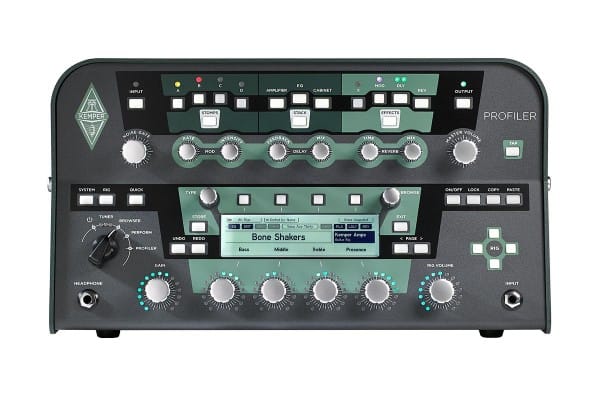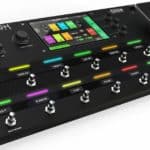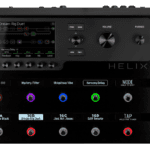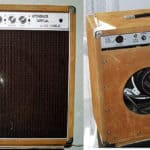Crafting the perfect tone is a never-ending quest for most guitarists.
Especially for those that really care about it.
In the context of this quest, there are many discussions among players.
On one side there are the purists that only use real physical gear and claim they can detect a fake digital copy from miles away.
On the other side, there are the more open-minded guys (no offense to purists) that will try just about anything that could improve their sound and quality of life, in terms of convenience.
Some years ago, when the Kemper profiler amp stormed the market with its almost black magic function of capturing the soul of a real amp and allowing you to use it on demand, a lot of more conservative players started second guessing their principles.
But, in reality, and as opposed to this antagonistic picture I painted, there’s a place for both “real” and digital amps.
While real amps are the ultimate tool for getting a great tone, it’s indisputable that the Kemper is a more convenient piece of gear because of its transportability and the amp profiling functionality that allows it to capture the tone of any amp. However, it is also an expensive piece of gear.
In this article, I will go in-depth about what makes the Kemper a great alternative to a real amp, but also why physical amps are still a thing.
After leaving this page you will have a clearer idea about what could work better for you, in your different needs as a musician.
Are you ready to get started?
Let’s go!
How does the Kemper modeling amp work?
The Kemper profiler amp is a piece of gear that revolutionized the industry a few years ago.
Its main feature, and what gives it its name is the ability to “capture” the tone of a real amp.
To capture another amp, you just need to plug the kemper in front of it and then record the battery of weird sounds the Kempers runs through it with a mic that’s plugged back into the Kemper.
With that info, the processing unit within the profiler creates a new simulation that feels and sounds extremely close to the real thing and even allows you to tweak its EQ when it’s done.
Of course, the tone controls of the real amp are not replicated perfectly since the capture is done with the static preset you decided on.
These profiles are also easily shareable, and you could upload to your unit captures that professional engineers have done in their million-dollar studios.
Apart from this, the Kemper offers everything that you would expect from a multi-effects simulator, and is an amazing replacement for regular amps, especially when playing live or practicing at home.
Kemper pros
Here are some of the good things the Kemper does:
- A lot of amps, cabs, and effects available
- Ability to capture and profile your own amps
- Decent sounding presets out of the box
- The ability to mix and match and create unique sounds
- Cheaper than buying all the gear it profiles
- Easily transportable and relatively lightweight
- Companion app to craft your tones on your computer
- Great feel and overall tone
- A big community of users that share tips and presets
- Great deal of professionally captured amp profiles on sale online
Kemper cons
Here are some drawbacks to the Kemper:
- You won’t use most amps, cabs, and effects it comes with
- The sheer amount of options for each part of your rig makes it difficult to decide
- Although being cheaper than individual gear, it’s still an expensive unit
- Old-timey way of configuring rigs on the physical unit makes you rely on the PC app
- For some people, the Kemper is still a step behind real amps
- Players that are not very tech savvy might not like its workflow
- You will need a powered FRFR speaker to practice at home, or use headphones
- The powered unit is more expensive
- The profiling function might not be useful to all players
Real amp pros
Here are some benefits of a real amp:
- Way simpler and easier to use than a multi-FX
- Sounds great out of the box
- Best sound and feel possible
- Combo amps are the ultimate plug-and-play solution
- It’s way easier to experiment with new sounds by mic’ing a real amp
- Can also work as your stage monitoring system
- Small tube amps might sound and feel better than the Kemper at a fraction of the cost
Real amp cons
Here are some bad things about real amps:
- They are heavy and cumbersome to carry around
- Tube amps can be more expensive than the Kemper
- Limited tonal possibilities
- For half stacks, you will also need to get a speaker cabinet
- Tube amps need regular maintenance
- Naturally noisier
- Prone to interference
- Require proper ventilation
- Tube amps require to be warmed up to sound properly
- Tube amps only reach their full potential at high volumes
Which is best for you?
Deciding on which kind of gear is better for you is a very personal process and will depend exclusively on your needs and the stage you are at as a player.
Here, in GearAficioinado I don’t intend on making the hard decisions for you, however, I always try to give you examples of different use cases to push you in the right direction.
For this particular topic, there are many alternatives, and variables, but know that a lot of professional players choose digital units such as the Kemper to play live and to tour due to its convenience, while they keep their real amps in the studio for getting the best tone possible when recording.
Capturing your favorite amps and then using the profiled version live is an alternative that most pros that choose the Kemper rely on.
Let’s see some particular situations where you could choose one over the other:
- If you are on a tight budget a cheaper amp might be your only choice
- If you play a lot of shows in different venues, a Kemper will be very convenient
- If you have a studio, or usually participate in high-end projects, an amp will sound better
- If you mainly practice and record at home, a Kemper will be the best choice
- If you hate spending hours tweaking to get a proper tone, go for a real amp
- If you play many different genres and use a lot of effects, go for a Kemper

Hello there, my name is Ramiro and I’ve been playing guitar for almost 20 years. I’m obsessed with everything gear-related and I thought it might be worth sharing it. From guitars, pedals, amps, and synths to studio gear and production tips, I hope you find what I post here useful, and I’ll try my best to keep it entertaining also.





